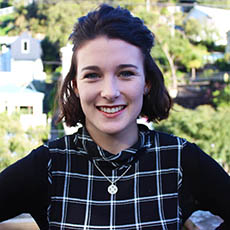Student conducts electrifying research
New research from a Victoria University of Wellington design student and lecturer could pave the way for concussion-detecting helmets or robots with a sense of touch.

New research from a Victoria University of Wellington design student and lecturer could pave the way for concussion-detecting helmets or robots with a sense of touch.
While some students enjoyed time out over the summer break, Tessa Brownlee took part in the Victoria Summer Research scholarship programme, with the University providing $6,000 to support her work.
Tessa worked alongside Victoria industrial design lecturer Jeongbin Ok on Jeongbin’s conductive resilience project.
Tessa’s role was to design and test flexible pressure-sensing structures for use in 3D-printed medical, sporting and industrial products. Her research was focused on investigating the possibility of using flexible structures, which conduct electricity, for a sensor that is driven by force or pressure. This sensor could then create analogue and visual responses according to the changing amounts of pressure and tension applied.
This research was conducted using digitally fabricated structures designed on Rhino and Grasshopper computer software, and an LED circuit was also built to verify the practicality of the results.
Tessa says that with some development, the research could be used to create products including pressure-mapping footwear, concussion-detecting helmets, augmented touch for minimally invasive surgery, or tactile sensory application in robots.
“In terms of uses for the research, I’m most inspired by the possibility of these sensors being used in Lightwriters for patients with motor neuron disease. Lightwriters are portable voice output communication aids for people with speech loss resulting from a range of acquired, progressive and congenital conditions. The adaptability of 3D-printing would mean the sensors used for Lightwriters could be printed within smaller and more organically shaped Lightwriters, which could fit within a patient’s hand. This would ultimately reduce the amount of movement needed for a patient to communicate.”
Jeongbin provided ongoing support for Tessa during the programme.
“Through Jeongbin, I had the opportunity to present the conductive resilience research at the New Zealand Product Accelerator meeting in Auckland, which was an amazing experience, allowing me to discuss the research with industry professionals and students from a range of areas including chemical engineering and materials science.
“I would definitely recommend the summer scholarship programme to other students. It’s a rewarding and exciting learning experience. I loved being involved in an innovative project that used emerging technologies, products and materials. Not only that – it’s a great way to make contact with lecturers and other students within your school.”
See more stories about Summer Research Scholarships
